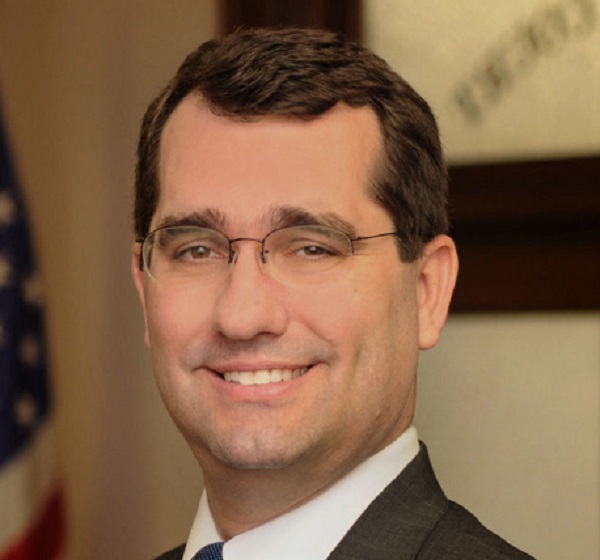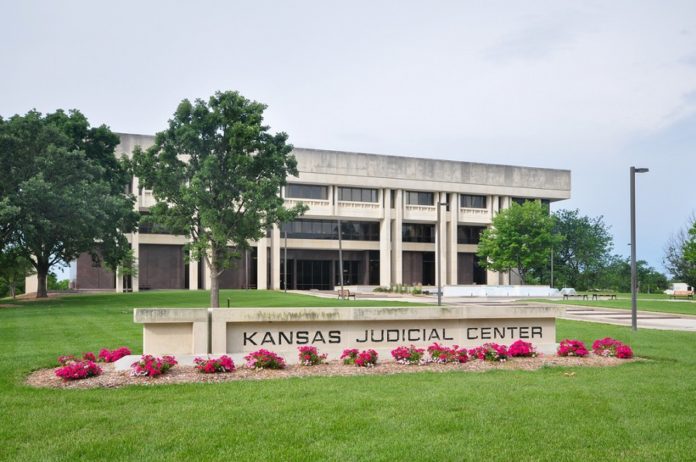Kansas Attorney General Derek Schmidt on Wednesday announced his plans to ask the state Supreme Court to revisit its landmark ruling that found the right to an abortion is embedded in the Kansas Constitution.
Schmidt said he would ask the court to reconsider its interpretation of the constitution in appealing Shawnee County District Judge Teresa Watson’s decision striking down a 2015 Kansas abortion law as unconstitutional.
Watson found that the law, which banned some dilation and evacuation abortions, violated the state constitution’s Bill of Rights as interpreted by the Kansas Supreme Court in its 2019 decision.

The state Supreme Court made that ruling on the abortion law in question and sent it back to the lower court for further review under a new legal standard.
Watson struck down the law using the court’s new standard, although she expressed her disagreement with the ruling.
“While this court firmly disagrees with the legal reasoning and conclusions of the Kansas Supreme Court as set forth in the majority opinion, this court is duty bound to follow its direction,” Watson wrote in her decision.
The Supreme Court’s decision applied a strict scrutiny standard to abortion regulations, meaning they must serve a “compelling governmental interest” and be must “narrowly tailored” to further reach that interest.
In a filing with the Supreme Court, Schmidt argues that Watson improperly applied the strict scrutiny standard in finding the law unconstitutional.
He argued that Watson incorrectly found that the state didn’t have a compelling interest in “regulating and maintaining the ethical integrity of the medical profession.”
He also contended that the judge wrongly found that the law was not a narrowly tailored solution to advance the state’s interest in “promoting respect for the value and the dignity of human life.”
Watson saw it differently.
“Banning (a dilation and evacuation) abortion
“According to the evidence before the court, it would leave no alternative for second trimester abortions other than more complicated, less reliable, less tested, and high-risk procedures,” she wrote.
The dilation and evacuation procedure was used in 423, or about 5.6%, of the 7,542 abortions that were reported in Kansas during 2020, a state health department report shows.
Abortion opponents have labeled the abortion procedure in question a “dismemberment abortion.”
The legislation defined the procedure as a physician removing the “unborn child one piece at a time” by using “clamps, grasping forceps, tongs (and) scissors” that “grasp a portion of the unborn child’s body in order to cut or rip it off.”
Kansas was the first state in the country to pass a ban on this type of procedure, which former Gov. Sam Brownback signed into law.
Three states – Nebraska, West Virginia and Mississippi – now have similar laws in place, according to the Guttmacher Institute, which supports abortion rights.
The courts have temporarily blocked the law in four states, including Kasnas.
Laws have been permanently halted in three other states including Alabama, Kentucky and Texas.
Schmidt, who is running for governor next year, immediately drew criticism from abortion rights supporters.
“The attorney general is wasting taxpayer dollars and other state resources by dragging out their defense of Kansas’s unconstitutional ban on the standard method of abortion after approximately 14 to 15 weeks of pregnancy,” said Genevieve Scott, senior staff attorney at the Center for Reproductive Rights.
“The Kansas Supreme Court has been extremely clear on this issue: abortion is protected as a fundamental right under the state constitution. We will continue to fight on behalf of Kansans in court,” Scott said in a statement.
Schmidt’s Republican rival in the governor’s race, former Gov. Jeff Colyer, said the court and its ruling were “wildly out of step with Kansas values and law.”
“This terrible ruling is the result of a terrible court. The only dissenter was the only justice appointed by our administration,”Colyer said.
The attorney general’s appeal returns the case to a state Supreme Court that is different – although maybe not philosophically – from the one that ruled on the case in 2019.
The court decided the 2019 abortion case 6-1. The lone dissenter was Justice Caleb Stegall, who was appointed by former Gov. Sam Brownback.
Three of the justices ruling for abortion rights in that case have been replaced after retiring from the court.
Democratic Gov. Laura Kelly, a staunch supporter of abortion rights, has appointed three of the court’s seven justices since taking office in 2019.
Two of the governor’s appointments – Evelyn Wilson and Melissa Standridge – were appointed over the objections of Kansans for Life.
KFL opposed Standridge because – as a former state appeals court judge – she sided with a ruling that found the right to an abortion was enshrined in the state constitution.
It was that ruling that was appealed and upheld by the state Supreme Court.
Kansans for Life also opposed Wilson, criticizing contributions her husband made to candidates who supported abortion rights.
Jeanne Gawdun, lobbyist for Kansans for Life, acknowledged that the general leanings of the court haven’t changed substantially since 2019.
She said it underscores why Kansans need to pass a constitutional amendment that would ensure that abortion is not a protected right in the state constitution.
“The abortion industry, which brought the original lawsuit to allow live dismemberment abortions, is going after every limit on its industry,” she said.
“The only practical way that we can keep our existing pro-life laws in place is for the people of Kansas to pass the Value Them Both Amendment in August 2022.”
Mandy Culbertson, spokeswoman for Planned Parenthood Great Plains, said the litigation and the constutional amendment are part of an overall strategy to undermine sexual and reproductive health rights of women.
“We don’t need to change our state constitution or waste taxpayer dollars on frivolous legal challenges,” Culbertson said.
“We need to let women make personal medical decisions without interference from politicians,” she said.













